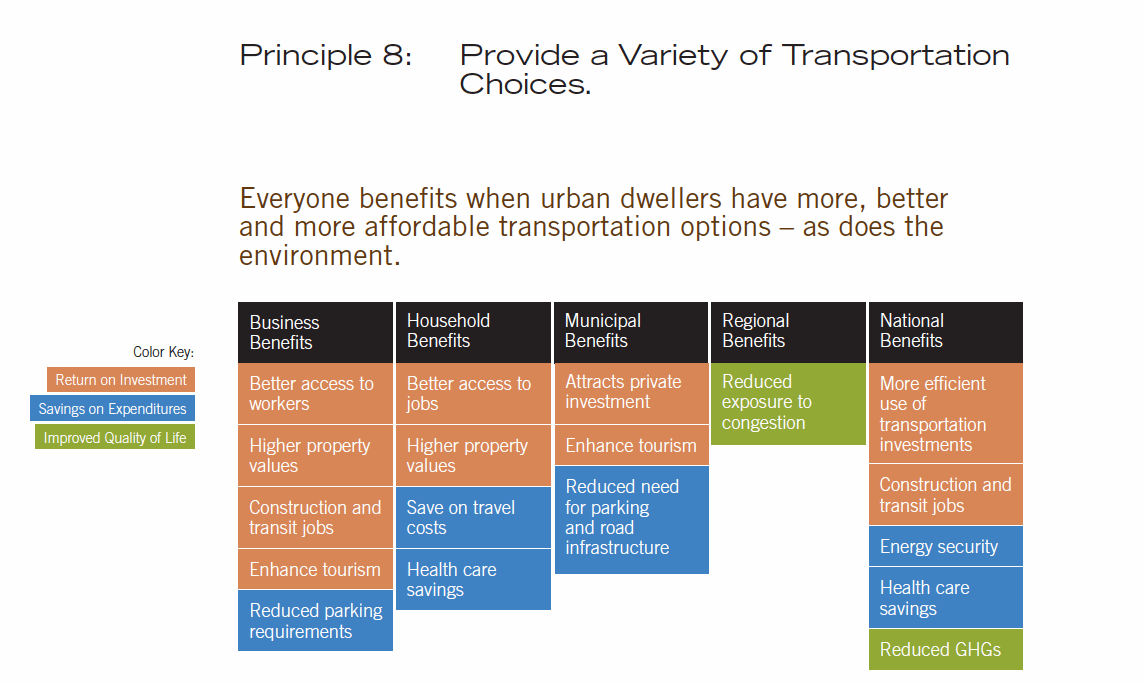CENTER FOR CLEAN AIR POLICY
Executive Summary
What we build – where and how – has a tremendous impact on how we sustain our communities, protect the environment and bolster prosperity. Common sense and empirical evidence, such as that documented in the Growing Cooler study, make it clear that building our neighborhoods, towns and cities in ways that require less driving can reduce greenhouse gas (GHG) emissions while making us less dependent on finite sources of energy. CCAP analysis has established that it will be difficult to achieve climate protection goals without slowing growth in vehicle miles travelled (VMT) even with rigorous vehicle efficiency standards and carbon prices.
But how many Americans want to live in more walkable neighborhoods, with homes and businesses closer to each other, with transportation options in addition to the car – the kinds of places created by following the principles commonly referred to as smart growth? Quite a few, according to real estate market trends and demographic analyses. Are smart-growth strategies cost effective for reducing GHG emissions? Yes, according to analyses such as Moving Cooler 5 and CCAP’s “dollar per ton” study.
What, then, is the economic impact of following these strategies? Clearly, the cost per ton of reducing CO2 is not the only consideration. How does this approach affect the bottom line for businesses, household budgets and government balance sheets? Those are the questions elucidated in Growing Wealthier, as we also examine quality-of-life concerns beyond traditional economic measures, such as public health and well-being, community vibrancy, thriving ecosystems and global climate protection.
…
Conclusions
Even as the evidence in favor of smart-growth strategies continues to mount, multiple barriers are slowing widespread implementation, including institutional inertia, out-moded zoning codes and transportation policies, investor cautiousness, and citizen resistance to change.
While these barriers are being addressed in community after community, and increasingly at the federal level, it is our belief that the “tipping point” will come when the economic payoff is more broadly understood. It is with this in mind that we have written Growing Wealthier. The preponderance of the evidence leads us to conclude that an inclusive planning process that yields more walkable neighborhoods with broader housing and transportation options can help communities, businesses and individuals make money, save money and improve quality of life.
Understanding how to design urban forms for the 21st century that address the multiple goals of economy, environment and equal opportunity is a challenge that we can meet head on. The opportunity is here to build upon our knowledge of successful places and create more of them. Success begets success. It is our hope that Growing Wealthier will aid policymakers, planners, developers and citizens in creating happier, healthier and more prosperous communities while conserving natural resources.
There are many steps we must take to ensure that our children inherit a planet and an economy with a bright future. Investing the time and money to grow our communities to be more resilient, more efficient and more satisfying to the soul surely offers a tremendous payoff.
Download full report: Growing Wealthier
About Center for Clean Air Policy
www.ccap.org
Mission statement: To significantly advance cost-effective and pragmatic air quality and climate policy through analysis, dialogue and education to reach a broad range of policy-makers and stakeholders worldwide.
Tags: CCAP, Center for Clean Air Policy, GHG, Greenhouse







 RSS Feed
RSS Feed